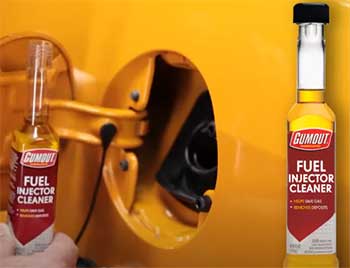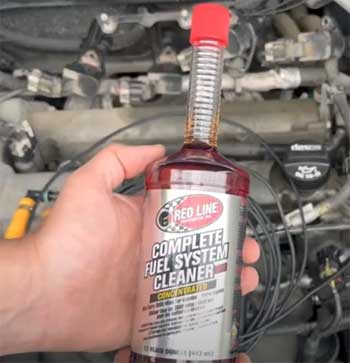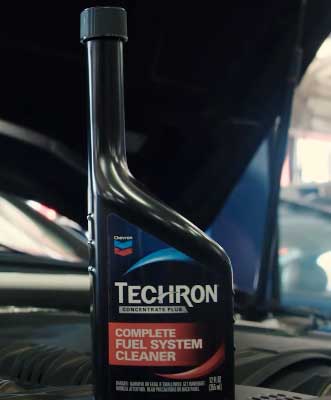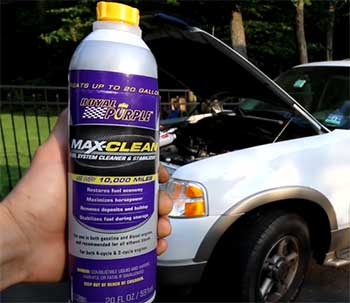When it comes to maintaining your vehicle’s performance, one product I swear by is Gumout Fuel Injector Cleaner. It’s not just another bottle of additives, it’s a proven solution that has kept my car running like new, even after surpassing 100,000 miles.
If you’re wondering whether to invest in a bottle, I can confidently say that it’s worth it. Let me explain why you should grab one today and how it could save you from costly repairs down the road.
Why Gumout Fuel Injector Cleaner Stands Out?

Let’s face it—your engine is the heart of your vehicle.
Over time, carbon deposits accumulate in the fuel injectors, intake valves, and ports.
This build-up can significantly affect the performance, mileage, and even emissions of your car.
This is where Gumout steps in, offering a formulated cleaner that specifically targets high-mileage vehicles (75,000 miles and up), restoring performance and fuel economy while preventing future build-ups.
After using it in my 2007 Toyota truck, I can tell you firsthand that this product works. My vehicle used to suffer from occasional rough idling, and I was worried about engine wear.
But after a few treatments with Gumout, my car’s smoothness was restored. It felt like a tune-up in a bottle.
Pros of Gumout Fuel Injector Cleaner
I’ve tried a few fuel additives over the years, but Gumout really stands out for several reasons. Let’s break down the pros:

- Noticeable Improvement in Performance From my personal experience, the product enhances throttle response and engine smoothness. Several users have mentioned how their pedal response improved after using Gumout. I can definitely attest to that! It cleans fuel injectors, intake valves, and ports, meaning your engine breathes easier and works more efficiently.
- High Mileage? No Problem! One of the most significant advantages is its formulation for vehicles with over 75,000 miles. Many of us drive older cars, and with age comes performance issues. Gumout was designed to tackle these problems by cleaning out those carbon deposits that naturally accumulate with use.
- Prevents Future Carbon Build-Up It’s not just a one-time fixer-upper. Gumout also prevents future build-up in your injectors and valves. For me, that means peace of mind. By using it every 3,000 miles, I know I’m keeping those harmful deposits at bay, protecting my engine for the long run.
- Oxygen Sensor Safe Many modern vehicles have sensitive oxygen sensors, and I know some people hesitate to use cleaners because of this. However, Gumout is completely oxygen sensor safe, which means you don’t have to worry about causing damage to this critical component.
- Works in Turbocharged and Supercharged Engines For those of you with turbocharged or supercharged vehicles, you’ll be happy to know that Gumout is safe for use in these engines. I’ve seen positive feedback from people with performance vehicles who’ve used Gumout without issues.
- Affordable and Easily Accessible At around $10 a bottle, it’s a small investment that can prevent much larger repair bills down the road. It’s also available at almost any auto store, so getting your hands on it is easy.
Cons of Gumout Fuel Injector Cleaner
While I’m a big fan of this product, no product is without its downsides. Here are a few things to keep in mind:
- Works Best as Preventative Maintenance If your engine is severely clogged or already suffering major mechanical issues, Gumout might not be a magic bullet. In extreme cases, mechanical cleaning may still be required. This cleaner is more of a preventative maintenance tool, best used before major problems develop.
- Requires Regular Use To maintain your engine’s performance, Gumout recommends using their product every 3,000 miles. While this isn’t too much of a hassle, it does require some diligence to get the best results.
- Might Not Resolve All Check Engine Lights Although it can fix minor issues related to fuel injector cleanliness, it’s not going to solve every problem. I once had a catalytic converter-related check engine light, and while Gumout helped reduce power lag and delay further issues, a more comprehensive solution was needed.
Maintenance Tips: Getting The Most Out of Gumout
So, now that you’re convinced to give it a try (or maybe you already have), how can you ensure that you’re using Gumout most effectively? Here are a few maintenance tips I’ve learned along the way.
- Use It Every 3,000 Miles I know I mentioned this before, but it’s worth repeating. By adding Gumout every 3,000 miles, you’ll ensure that carbon deposits don’t have a chance to build up. I keep a reminder in my phone to pick up a bottle after every oil change to keep things simple.
- Use It on an Empty Tank For the best results, you’ll want to add the entire bottle of Gumout to a nearly empty gas tank before filling it up. This way, it mixes well with the fuel and flows directly into the injectors. Don’t refill your tank until it’s close to empty again to ensure the cleaner has enough time to work through your system.
- Keep an Eye on Your Fuel Economy One of the perks of using Gumout is that it can improve your fuel economy by keeping your injectors clean. I’ve seen slight improvements after using it consistently. Keep track of your miles per gallon before and after treatment to see how your vehicle responds.
- Use with Premium Gasoline for the Best Results While it’s safe to use with any type of gasoline, I’ve noticed that using it with premium fuel tends to yield better results. The extra detergents in premium gas, combined with Gumout’s cleaning action, provide a more noticeable improvement in performance and smoothness.
Gumout Vs. Other Brands: A Closer Comparison
When it comes to fuel injector cleaners, Gumout certainly holds its own, but how does it stack up against other well-known products like Red Line, Techron, and Royal Purple? I’ve had the chance to use a few of these myself, and here’s my take on how Gumout compares.
- Gumout Vs. Red Line Fuel System Cleaner

Red Line is a popular choice, especially among car enthusiasts.
It’s known for containing a high concentration of Polyetheramine (PEA), a powerful cleaning agent that excels at removing carbon deposits.
While Red Line is a top-notch cleaner, it’s often pricier than Gumout.
In terms of performance, Red Line may offer a deeper clean for severely clogged injectors, but for regular maintenance, I found Gumout to be more than sufficient, especially when used consistently every 3,000 miles.
Plus, Gumout is more widely available and generally easier on the wallet, making it a more practical choice for everyday drivers.
- Gumout Vs. Techron Fuel Injector Cleaner

Techron by Chevron is another heavy hitter in the fuel system cleaner market, and it’s often seen as one of the go-to products.
Like Gumout, Techron also uses PEA, which means it’s highly effective at breaking down carbon deposits.
In terms of cleaning power, I’d say Techron and Gumout are fairly comparable, with both offering noticeable improvements in performance, especially for high-mileage vehicles.
However, Techron tends to be more expensive than Gumout, and I didn’t notice any significant difference in results that would justify the higher price.
For budget-conscious car owners looking to maintain their engine without overspending, Gumout wins this round for its similar performance at a lower cost.
- Gumout Vs. Royal Purple Max Clean Fuel Injector Cleaner

Royal Purple’s Max Clean is known for its multi-purpose abilities, offering not only injector cleaning but also improvements in fuel economy and emissions reduction.
Royal Purple markets itself as a premium product, and the price reflects that.
While it does a good job of cleaning and improving overall performance, especially in high-performance or heavily modified engines, I didn’t feel that it offered a substantially better clean than Gumout in everyday driving situations.
For regular vehicle maintenance, especially for older cars with over 75,000 miles, Gumout provides nearly the same results without the premium price tag attached to Royal Purple.
Frequently Asked Questions (FAQ)
Yes, it’s entirely safe. Gumout is formulated to be oxygen sensor-safe and is also safe for use in turbocharged and supercharged engines. It won’t void your vehicle’s warranty, either.
While there are many options out there, I find Gumout to be one of the best for high-mileage vehicles, especially when compared to products like Seafoam or Techron. Its targeted formula for older engines gives it an edge in restoring performance.
For the best results, it’s recommended to add Gumout to an almost-empty tank and then fill it up with gas. This ensures that the cleaner mixes thoroughly with the fuel and has the maximum effect.
From my personal experience, Gumout works better for cleaning fuel injectors in high-mileage vehicles. Seafoam is a more versatile cleaner, but when it comes to injector performance and removing carbon deposits, Gumout delivers better results.
Final Thoughts: A Must-Have for Any Car Owner
If you’ve been on the fence about trying Gumout, let me make it simple: it works. I’ve experienced firsthand how it can restore smoothness, improve throttle response, and keep your engine running efficiently.
If you’re serious about maintaining your vehicle, especially if it’s got some miles on it, Gumout is an affordable and easy way to ensure your engine stays clean and healthy. Trust me—your car will thank you for it!

